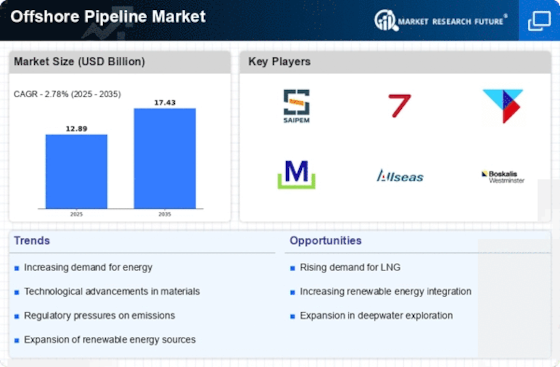Market Analysis
In-depth Analysis of Offshore Pipeline Market Industry Landscape
A variety of variables drive the offshore pipeline market's desire for dependable and efficient oil and gas transportation from offshore fields to onshore facilities. Continuous global energy demand drives these processes. As the offshore oil and gas sector grows to fulfill this demand, offshore pipelines become essential transportation infrastructure. These pipelines link offshore production facilities to processing units and distribution sites, assuring energy supply security and efficiency.
Technological advances drive offshore pipeline industry dynamics. Pipelines that can resist deepwater and subsea conditions are made possible by advances in pipeline materials, construction, and monitoring. Advanced materials like corrosion-resistant alloys and clever sensors improve offshore pipeline safety.
Government laws and geopolitics greatly impact offshore pipeline markets. Offshore pipelines are designed, built, and operated under strict safety and environmental restrictions to reduce oil spills and meet environmental requirements. Geopolitical concerns including international agreements and territorial conflicts complicate offshore pipeline project design and development for industry players.
Offshore exploration and production growth affects pipeline markets. As the oil and gas sector explores deeper seas and offshore regions, efficient and cost-effective pipeline solutions are needed. Pipeline projects expand due to major offshore reserve finds, and offshore pipelines are needed for timely and reliable transfer of harvested resources.
Established pipeline operators, engineering firms, and construction organizations compete in offshore pipelines. Companies explore and develop pipeline technologies to save construction costs and boost project efficiency. As operators, contractors, and technology suppliers work together to improve project execution and assure offshore pipeline project success, strategic alliances are prevalent.
Offshore pipeline market trends depend on supply chain dynamics, including specialized equipment and materials. Pipeline projects depend on the availability of pipes, valves, control systems, and other components and qualified offshore construction workers. Meeting the industry's requirement for timely and cost-effective offshore pipeline solutions requires efficient supply chain management.
Offshore pipeline markets are also affected by end-user choices and project needs. Oil and gas companies choose pipelines with little maintenance, extended dependability, and safety and environmental compliance. The flexibility of offshore pipelines to support expanding exploration and production operations, especially the transportation of unconventional resources, impacts purchase choices and encourages offshore industry adoption of sophisticated pipeline technology.
The offshore pipeline market is influenced by technology advances, regulatory impacts, industry need for efficient resource transportation, competitive dynamics, supply chain concerns, and end-user preferences. Offshore pipeline stakeholders must manage these complex dynamics, adapt to changing conditions, and engage in innovation to meet offshore oil and gas sector challenges and possibilities.


















Leave a Comment